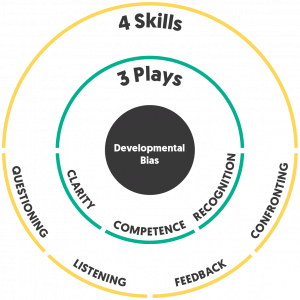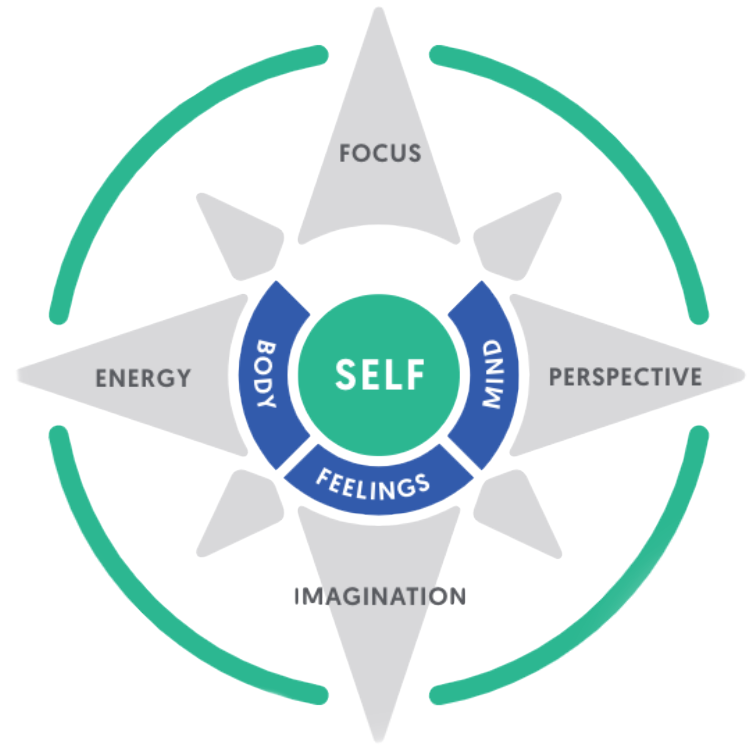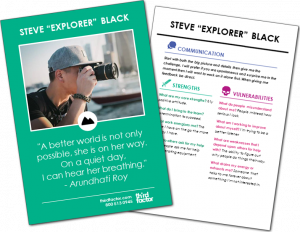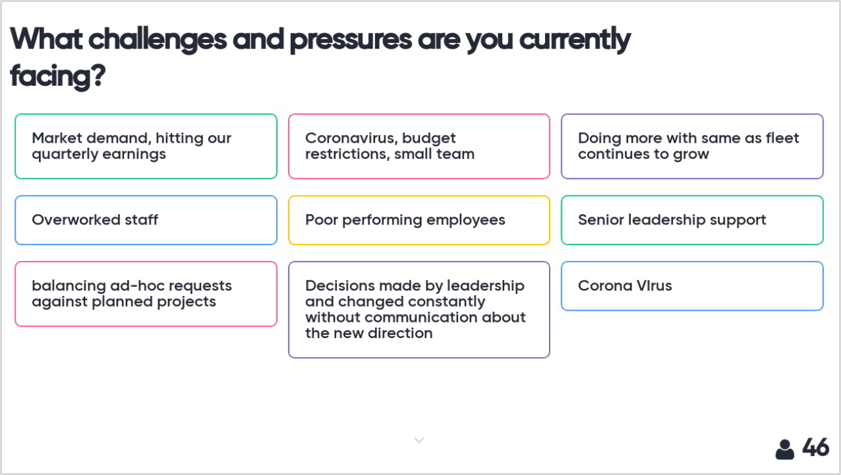Maintaining Team Motivation Through The Troughs
Available on demand
Register Now
As the pandemic drags on, maintaining motivation and engagement is an increasing challenge for leaders.
Significant prolonged uncertainty, a relentless volume of work, the collapse of a separation between work and home life, and – in some cases – the absence of traditional sources of motivation like raises, promotions, and informal camaraderie in the office, means motivation has rarely been harder to come by.
In this 60-minute webinar, Third Factor CEO Dane Jensen will uncover research that will help you zero in on your team’s emotional state, and introduce four allies leaders can tap into to fight against the tide of disillusionment and keep people energized, resilient and motivated through the months to come.
You’ll leave with a better understanding of your team’s emotional state, and practical ideas for maintaining motivation that you can start using right away.
You should attend if:
- You are responsible for leadership development and want new ideas for driving operational efficiency
- Your performance management strategy calls for improvement in employee engagement and leadership efficacy
- Uncertainty and fatigue caused by the pandemic is having a negative impact on your business
- You want to build your own ability to motivate your people over the months ahead
Maintaining Team Motivation Through The Troughs
There are no lives sessions of this webinar upcoming. Fill out the form below to register to watch this webinar on demand.
 About the presenter:
About the presenter:
Dane Jensen advises senior leaders and their teams on how to perform under pressure in our disruptive world.
Dane has worked with executives in 23 countries on 5 continents. As CEO of Third Factor, Dane oversees delivery of the firm’s leadership development programs throughout North America. Dane is Affiliate Faculty with UNC Executive Development at Kenan-Flagler Business School in Chapel Hill, NC. He also teaches in the full-time and executive MBA programs at the Smith School of Business, Queen’s University in Ontario, Canada.
In addition to his corporate and academic work, Dane advises athletes, coaches, leaders, and boards in the Olympic and Paralympic sport systems. He is author of The Power of Pressure: Why Pressure Isn’t the Problem, It’s the Solution (HarperCollins, 2021), and a regular contributor to Harvard Business Review. He lives in Toronto with his wife and their three children.
Dane Jensen
CEO, Third Factor
Over the course of your career, you’ve probably handed out a few “feedback sandwiches” – a piece of criticism hidden between two pieces of positive reinforcement. But as Peggy Baumgartner lays out in her latest article for HBR, you need to stop softening tough feedback.
In the article, Peggy outlines why the “sandwich” doesn’t work:
🧹 People who think highly of themselves might brush off the piece of corrective feedback, giving more weight to the positive news surrounding it.
😟 But those who are self-critical might dwell on the bad news and miss out on the good.
🐍 And the lack of direct communication makes people feel like they’re victims of a sneak attack.
Instead, Peggy offers simple advice for leaders who need to give feedback: Describe the behaviour you want to reinforce or correct, explain the impact of the behaviour, and outline what you want them to do.
Click here to read the article on hbr.org.
In our 3×4 Coaching virtual learning journey, participants are given challenges to apply what they’ve learned on the job. In this video, our Chief Learning Officer, Peggy Baumgartner, showcases how one program participant used a challenge activity to make a lasting difference in his organization.
When it comes to coaching, it’s not about what you know; it’s what you do that ultimately matters. That’s why we make challenge activities a part of our online learning journeys. Participants are given a challenge and encouraged to make note of what works for them and what impact it had. One participant, taking the 3×4 Coaching program through Queen’s Executive Education, really took his challenge on recognition to heart.
Following the challenge, Dave Cooper shared that he had written a letter to his team to recognize their contributions through the pandemic. As the manager of retail leadership development for Sport Chek, a major retailer with approximately 250 stores, his team had been hard hit by the Covid-19 pandemic.
“Our training team got very disconnected from the stores, which was really difficult for me personally and difficult for our team,” Dave told us. “After going through eight months of this constant stress, I wanted to see if I could write something to recognize what they’d accomplished how long they had endured. And maybe give them a little nudge that they have more in them.”
Dave’s letter to his team was particularly effective because it took all the key concepts from the recognition module and used them in a very powerful way:
- Make it relevant. Dave’s first success was in his timing. Rather than waiting until everything had settled down, he took the time to recognize his people in the moment and let them know they were seen.
- Focus on the behavior, not results. In the letter, Dave recognized his people not for the results, but for their efforts. “You and your team have persevered well over 200 days,” the letter reads. “This is an incredible achievement!”
- Make it a habit. Dave told us that he didn’t want it to be a one-time thing. Rather than writing a letter to his team and calling it job done, he set reminders in his calendar for future times he know would be busy to remind himself to recognize his team.
- Extend influence & ownership to others. The impact of Dave’s letter didn’t stop at his direct reports. He challenged them to pay it forward: “thank your management teams, your full-timers, your part-timers and anyone else who has contributed to your store’s success,” he wrote. “Everyone plays a role!”
The people in Dave’s organization are sure to feel seen, heard and incredibly valued after reading his letter.
It’s always exciting to see the concepts we teach transferred back into the work world. If you’re excited about the possibilities coaching can open up, you can bring the 3×4 Coaching program to your organization or enrol as an individual through Queen’s Executive Education.
In this article
Explore our virtual leadership development options to meet your current needs.
In about 90% of our conversations with clients, the first question we’re asked is “what can you deliver remotely?” And – the answer is ‘a lot!’
We’ve spent the past six months transforming our product line and, since April, we’ve had more than 5,000 learners go through our programs remotely – from webinars on leading remotely for 500+ people, to immersive 6-week learning journeys to Coaching mastery for smaller cohorts, to building resilience skills in the EMBA class at Queen’s Smith School of Business.
One Size Doesn’t Fit All
Depending on your goals for virtual learning, different approaches are required. We’ve taken a ‘small / medium / large’ approach to our product development to meet the needs of a variety of scenarios:
Large Group Experiences
Webinars or a-synchronous content to spark ideas and motivation for groups of any size.
Targeted Group Programs
Learning journeys that integrate video, synchronous learning, 1:1 coaching and application to build mastery for up to 49 people.
In-depth Cohort Programs
Half-day interactive instructor-led sessions for up to 18 people to build core skills.
Whatever your needs – we’re likely to have a virtual solution that hits the mark in terms of depth, duration and class size.
Get the catalog
Download a full summary of our leadership development programs.
Timeless skills + the right tools for right now
Of course, we have a range of virtual options in our core competencies: coaching skills for managers, resilience skills for all, and self-awareness skills to enable more productive collaboration. And, we are continuously launching virtual programs that give learners the skills they need to be successful right now.
Note that we are continuously developing new offers (and adapting our in-person programs to virtual delivery) so this list will be updated as new programs come online.
Coaching skills for managers

The 3×4 Coaching model explores the 3 plays and 4 skills consistently executed by world-leading coaches.
We have a full range of options for bringing our industry-leading 3×4 Coaching model to life virtually – with a specific eye to how to coach in a virtual environment.
In-depth Cohort Programs
Coaches are leaders who do all they can to help people improve and succeed. It is a way of thinking and interacting with people that communicates high expectations, respect and caring. In this 4 – 6 week (depending on your desired pace) virtual program, individuals learn the concepts and skills of a coaching style of management that builds commitment, drives employee engagement, gets results, and integrates this learning into the flow of their work.
Get a feel for the learning experience in this 3-minute video overview of the program.
Targeted Group Programs
Coaches are leaders who do all they can to help people improve and succeed. It is a way of thinking and interacting with people that communicates high expectations, respect and caring. In this 4 – 6 week (depending on your desired pace) virtual program, individuals learn the concepts and skills of a coaching style of management that builds commitment, drives employee engagement, gets results, and integrates this learning into the flow of their work.
Our practical, 4-step map for challenging conversations is rooted in our 25 years of experience helping elite athletes manage emotions under intense pressure. Participants explore methods of preparing to confront, learn an effective format for an opening statement, practice managing reactivity and discuss how to close the conversation with accountability built-in.
Large Group Experiences
Learning coaching skills is the best way to dramatically increase your people’s commitment level and performance. This interactive 1-hour online session starts your powerful coaching journey.
3×4 Coaching Asynchronous Video Program
The 3×4 Coaching Video Program is a self-paced, asynchronous learning journey that unpacks the 3 plays and 4 skills of exceptional coaches. It provides learners with a powerful, easy-to-understand model for coaching people to higher levels of results and engagement.
Watch a brief sample of the 3×4 Coaching video program
Resilience skills for all

Building Resilience is aimed at giving participants a toolkit of inner skills to navigate their high pressure realities.
Rarely has resilience been as relevant as it is right now. We take our 30+ years of experience in resilience, and bring it to life in a way that gives people the insight and skills needed right now.
In-depth Cohort Programs
The virtual Building Resilience program synthesizes 30 years of science-backed and performance-proven strategies into a practical toolkit that participants can use to stay healthy under pressure and recover when they are thrown off balance. Our approach to resilience draws on work in elite sport, teaching and research in academia, and work with thousands of people in organizations of all sizes. Building Resilience is a transformative experience that allows participants to learn in the flow of work while changing the way they relate to pressure.
Targeted Group Programs
A leader’s ability to stay resilient through setbacks and be predictable under pressure is the #1 indicator of how their team will weather the storm. Learn practical techniques for staying even-keeled when it matters most in this 1/2-day online workshop.
Large Group Experiences
This online session equips participants with an understanding of how uncertainty and pressure impact their performance and health, an awareness of the choices they have to enhance their resilience under pressure, and a guided, applied exercise that will specifically tackle how they are framing and taking direct action on the areas that will most impact their performance and resilience.
Topical skills leaders need right now

Our Maintaining Team Motivation Through The Troughs program teaches leaders four allies for fighting disillusionment.
A collection of fit-for-purpose programs that address hot button issues like motivation through prolonged periods of uncertainty, challenging conversations from a distance, and the imperative for agility and personal ownership over re-skilling.
Targeted Group Programs
As the pandemic drags on, maintaining motivation and engagement will become a primary challenge for leaders. Learn practical techniques to keep people energized, resilient and motivated, inspired by Olympic coaches and athletes, in this 1/2-day online workshop.
Large Group Experiences
Meta-skills are the connective tissue that allow people and organizations to let go of the skills that have anchored their successful past and master and embrace new ways of working – in other words, to evolve. Packed with ideas on both how to foster the development of meta-skills for yourself, and how to build meta-skilled organizations as stewards of talent, this keynote lays out a framework for six key meta-skills that allow individuals and organizations to see clearly, move quickly, and stay the course.
Self-awareness & collaboration

The “player’s card” is one of our favourite tools for helping learners translate self-awareness to communication and action.
The Attentional and Interpersonal Styles Inventory (TAIS) was originally developed to help Olympic athletes and elite military units optimize performance in high-pressure situations. Every day, these individuals must make critical decisions under pressure with less than perfect information. Since its introduction, business leaders have recognized that their people face similar, if not identical, problems and have made the TAIS their assessment of choice.
Our work with the TAIS and fostering self-awareness has never been more vital – or easier to deliver. 1:1 coaching and self-awareness work is a natural fit for a virtual environment.
Targeted Group Programs
The Self-Aware Leader program combines the TAIS assessment, three one-on-one coaching sessions, the creation of a personal action plan to address a real business challenge, an ability to chart your progress and adjust your approach through the guidance of a coach. It will help leaders understand and leverage their strengths under pressure and identify what changes if made, would matter the most.
Large Group Experiences
TAIS Assessment + 1:1 Coaching
Whether you want to build self-awareness for a few executives or all of your people managers, the TAIS can help them identify environments and performance situations in which they will thrive and excel, when and how they are most likely to make mistakes and what they can do to ensure you will perform well under pressure. Participants receive an individual report detailing 18 personal styles as they relate to attention, information, leadership, social and communication and have the opportunity to build further clarity with a 1:1 coaching call.
Let’s talk!
If you’re interested in any the above – or anything that you don’t see here – let’s chat! You can get in touch at hello@thirdfactor.com.
Download the catalog.
Get a complete overview of our coaching, collaboration and resilience programs.
Negative emotion is an incredibly volatile fuel. Our CEO, Dane Jensen, lays out how to harness its energy for building motivation in his latest article for Harvard Business Review titled Turn Your Team’s Frustration into Motivation.
In the article, Dane offers three tools for leaders to motivate people facing a setback:
🏷 Label the negative emotion and engage. Right or wrong, giving it a name helps uncover important information that can be used for moving forward.
👏 Feed the self-coach, not the self-critic. Encourage them to look for the opportunity in the crisis.
🛴 Channel energy to action. Use the moment to build a vision of a better future and build clarity around what it takes to get there.
Strong leaders don’t shy away from negative emotions. They lean into them and help their people use them to recover and grow.
Click here to read the article on hbr.org.
At Third Factor, we are sad to learn that Team Canada will not be competing at the Tokyo Olympic and Paralympic Games this summer. At the same time, we are also incredibly proud of the Canadian Olympic and Paralympic Committees for taking the lead and making the right decision for the health and safety of Canada’s athletes, coaches, staff, volunteers and fans.
The chaos, challenges and health risks posed by COVID-19 make the decision to withdraw from the Games a necessary one. Athletes are unable to train. Coaches and support teams cannot properly plan. Travel is unavailable and unsafe for family members and other attendees. And the sponsors that support athletes and teams are now unable to proceed with their marketing efforts without risking the appearance of being insensitive and out-of-touch given the current reality.
“We stand ready to support our athletes, coaches and leadership organizations through the coming months and in Team Canada’s inevitable return to Olympic competition.”
By withdrawing Team Canada from the Tokyo Games, the COC and CPC have made an important statement that this crisis is bigger than the Olympic and Paralympic Games and that our collective health and safety should be our only priority over the coming months. They have also given a clear answer to the athletes who have been tortured by uncertainty and were wondering whether they would have a chance to compete and, if so, whether they would have to risk their health in order to do so.
We join the COC and CPC in calling on the International Olympic and Paralympic Committees to postpone the Tokyo Games by one year so that all members of the international community may focus on their physical, mental and financial health, caring for loved ones, and doing their part to stop the spread of COVID-19.
For the last three decades, our organization has been proud to support the Olympic community in Canada. We stand ready to support our athletes, coaches and leadership organizations through the coming months and in Team Canada’s inevitable return to Olympic competition.
Signed,
Dane Jensen, Peter Jensen, Sandra Stark, Peggy Baumgartner, Garry Watanabe & Cyndie Flett on behalf of the entire team at Third Factor.
Editor’s note: Since publishing, we have learned that the IOC has officially postponed the start of the Tokyo Games.
Resilience – the ability to grow through pressure, recover and respond in the face of setbacks, and perform under pressure – is a skill learned in the troughs, not the peaks.
As a result of COVID-19, employees and managers are facing changes in pretty much every aspect of their work – what they need to do, how it needs to get done, where they need to do it from – and also facing the spectre of potentially significant impacts to compensation and results. There hasn’t been a time since 2008 in which resilience is more necessary or more top-of-mind.
Further reading: COVID-19: Ways Forward for Learning & Development
In the face of this tremendous uncertainty and need for resilience, we’ve developed a 60 minute, interactive, virtual, instructor-led session that will equip participants with an understanding of how uncertainty and pressure impact their performance and health, an awareness of the choices they have to enhance their resilience under pressure, and a guided, applied exercise that will specifically tackle how they are framing and taking direct action on the areas that will most impact their performance and resilience over the coming few months.
Participants will leave with a better understanding of what they can control, what they need to let go of, and how they can approach the current and coming uncertainty in a way that maximizes their resilience. As an organization, providing your people with the skills to navigate this period will build engagement and signal a strong commitment to their growth, development and well-being.
The coming few months may not be enjoyable, but with the right tools everyone can emerge with the satisfaction of knowing that they were up to the challenge and high levels of engagement with their job and organization.
Building Resilience When it Matters Most
This webinar has already happened, but you can watch it on demand. Please enter your information below and we’ll email you an access link.
About the presenter:
 Dane Jensen
Dane Jensen is the CEO of Third Factor and an expert on strategy, leadership, and resilience under pressure. Dane oversees Third Factor’s delivery of leadership development programs to leading firms across North America including SAP, TD, RBC, Uber, Twitter, the USGA, and others. He teaches in the Full-Time and Executive MBAs at Queen’s Smith School of Business in Canada and is Affiliate Faculty with UNC Executive Education at the Kenan-Flagler Business School. In addition to his corporate work, Dane works extensively with athletes, coaches, leaders and Boards across Canada’s Olympic and Paralympic sport system to enhance National competitiveness. He has worked as an advisor to Senior Executives in 23 countries on 6 continents, and his first book, tentatively entitled The Power of Pressure, will be published by HarperCollins in early 2021.
In this article:
Three imperatives for L&D during COVID-19
Our Building Resilience program opens by teeing up the ancient curse “may you live in interesting times.” These are interesting times indeed.
The COVID-19 outbreak is the third time this century that we have collectively dealt with significant disruption and uncertainty – following the terror attacks on September 11th, and the great recession of 2008-09.
The COVID-19 situation is particularly challenging for those of us in learning & development, whose work often centers on bringing groups of people together. Prohibition of non-essential travel and meetings, policies requiring self-isolation before returning to work, and even wide-scale office closures, such as those happening at major U.S. tech companies including Microsoft, Amazon, Google, Facebook and Twitter, create significant challenges to ‘business as usual’ when it comes to learning.
At the same time – periods of uncertainty and change are precisely the times at which learning is most vital. And, as anyone in adult education knows – relevance is critical to adult learners. When the need is real and present, adult learners are most open to learning new skills. Right now people are in acute need of skills to both handle the pressure they are facing and adjust to new ways of working.
“L&D teams can provide unique value and directly influence how the organization weathers the storm”
Connecting pressure to personal growth is vital for resilience over the long haul. If, as a leader, I feel like the pressure is just a weight on my shoulders that I must endure, it will have a significantly more negative impact than if I see how rising to this challenge can help me become stronger and better. Growth gives meaning to pressure – and our ability to help people see this tough period as a growth experience is a significant imperative for maintaining engagement at work.
Growth gives meaning to pressure.
Taken together, this makes the coming months a time when L&D teams can provide unique value and directly influence how the organization weathers the storm. The coming months will undoubtedly be a period of great pressure – but how heavy that pressure sits, and how skillfully it is navigated, is within L&D’s circle of influence.
By rising to meet this challenge, learning and development organizations can support their risk management teams, build esteem for the department among senior executives, show the ability of the department to deliver in critical moments, directly influence performance outcomes, and directly support an entire workforce through an extremely challenging time.
So, how can L&D navigate the choppy waters of risk mitigation policies while seizing the moment to step up and shine? We see three major imperatives:
1. Demonstrate agility + resilience – leverage technology to continue “regularly scheduled programing”
Personal growth and development is a major driver of satisfaction and engagement in the workplace. When other drivers of satisfaction and engagement are compromised, continuing to invest in learning is vital.
And, as learning organizations – we want to model the behaviours we are asking leaders to engage in: resilience, adaptability and flexibility. If we are asking others in the organization to continue to do their jobs in the face of disruption – it’s up to us to do the same.
“Think deliberately about a learning journey that is designed to sustain energy and support application”
Depending on the measures in place in your organization, this may include continuing to run in-person programming in small-medium sized groups – perhaps modified to focus on local attendees. In many cases, however, policies will necessitate the conversion of regularly scheduled programming into virtual delivery.
Speaking from the perspective of an organization focused entirely on the development of leadership, collaboration and resilience skills – there are two imperatives we see to getting this right:
Think Fortnite, not Netflix
There is a reason in-person, instructor-led training continues to deliver the best learning outcomes: it gives people a chance to engage directly with an expert, to learn from peers, and to debate, dialogue and practice. In short, it’s a participative experience. While it is tempting to replace in-person programming with self-paced programs and video libraries – think Netflix – when it comes to executive function skills like coaching, collaboration, and resilience, getting strong learning outcomes requires collaboration. This is the ‘Fortnite’ model: we’re in this together, working alongside each other, in constant communication, and working towards a common goal.

Think Fortnite, not Netflix – virtual learning should be interactive and participative.
Divide and conquer
With dates already reserved on learners’ calendars, it can seem logistically easy to replace a 1-day in-person program with a 1-day virtual session. Even the most expertly designed and facilitated virtual sessions begin to lose their energy, however, after the two-hour mark.
Instead, take advantage of the luxury of dividing learning up into more manageable modules. Freed from the requirements of a group of 25-30 learners traveling to one location for a short period of time, virtual sessions give you the opportunity to think deliberately about a learning journey that is designed to sustain energy and support application. The best designs involve modules that don’t require prolonged periods of attention, include interactivity and discussions that invite participation and reduce the temptation of distraction, and close with a clearly actionable outcome that learners can practice prior to the next module (i.e. an action learning-oriented approach).
Virtual instructor-led technology has come a long way in even the past 12 months. In the face of COVID-19 we’ve been working directly with many of our clients to use a technology stack focused on interactivity and collaboration to ‘convert’ their in-person experience into virtual ones – complete with breakout rooms, lively discussion, whiteboard sessions and polling. Take advantage of new technology to demonstrate resourcefulness.
2. Build resilience in all corners of your organization
Ultimately, resilience is built in the troughs, not the peaks. And, not only is this a time in which resilience skills are vital – it’s also the perfect time to support your people in building resilience.
In my forthcoming book, tentatively titled The Power of Pressure, I argue that the two key factors that ramp up pressure are importance (“this matters to me”) and uncertainty (“I don’t know how this will turn out”). The threat posed by COVID-19 delivers an unhealthy dose of both these ingredients.

Changing policies and sparsely populated offices are just two sources of uncertainty.
In the face of this pressure, learning and development teams have an opportunity to show that the organization cares not just about physical safety but also about people’s psychological wellbeing, and stands ready to help them learn the skills they need to not just survive but thrive through this period.
There are two key imperatives here:
Support physical resilience
Employee wellness programs have never been more important than they are right now. Sleep, nutrition and exercise are the basis of not just a healthy immune system but also a resilient individual. Now is the time to promote awareness of the programs available to your teams.
Build inner resilience
Resilience isn’t a genetic gift – it’s a set of skills that can be learned and mastered. Often we assume that resilience will be built naturally as a by-product of tough times – but just like an athlete needs a good coach to reap the developmental benefits of sport, so too do individuals need support in learning how to channel pressure into growth.
“In times of challenge, what’s often most challenging is that the old pressure doesn’t go away”
In our Building Resilience program, we do this by giving participants an understanding of how uncertainty and pressure impact their performance and health, and then grow their awareness of the choices they have and skills they can use to enhance their resilience under pressure.
I led a 90-minute virtual session on resilience for leaders at a major cruise line last week. As you can imagine, the pressure they are facing is immense. In our opening exercise, I asked them to identify the things that make this “interesting times” for them. Here is a random sample of the 46 responses I received:
 What’s most interesting to me is that the responses weren’t simply “coronavirus” 46 times. In times of challenge, what’s often most challenging is that the old pressure doesn’t go away – we simply add more to the pile, further compounding our already high-pressure lives.
In acute scenarios such as this one, people need to have a clear sense of:
What’s most interesting to me is that the responses weren’t simply “coronavirus” 46 times. In times of challenge, what’s often most challenging is that the old pressure doesn’t go away – we simply add more to the pile, further compounding our already high-pressure lives.
In acute scenarios such as this one, people need to have a clear sense of:
- What they can control – i.e. their perspective + their behaviours
- What they need to let go of – i.e. the situation + others’ responses
These choices apply to your learning organization as well. Most consequences of the COVID-19 outbreak are outside of your control. Policies will be handed down from senior executives. Despite best efforts, people may become ill. There may be disruption to supply chains, operations, and other critical components of your business. Having the discernment to identify the things outside of your control and the ability to let those things go is a critical aspect to resilience. A leader who can paint a clear picture of where we are going to focus our attention and what we are going to ignore is invaluable in any crisis.
How you prepare your workforce for this challenge, however, is within your control. Investing in resilience skills for your organization is an easy way to demonstrate empathy and support, improve performance and productivity, and arm your workforce with the skills to rise to the occasion.
The coming few months may not be enjoyable, but with the right tools everyone can emerge with the satisfaction of knowing that they were up to the challenge. This will greatly increase engagement with their own jobs as well as appreciation for an organization that cared enough to address the situation in a proactive, skill building manner.

With the right tools, everyone can emerge knowing they were up to the challenge.
3. Give People the 1:1 Learning They Crave (Without Breaking the Bank)
“The next few months provide a real opportunity for learning organizations to invest in the 1:1 learning that people crave”
All of the research into learning tells us that providing individualized, coaching is among the best ways to help people learn, achieve their goals, and feel satisfied with their progress. And yet, the cost of providing individualized coaching is often prohibitive at scale.
The next few months provide a real opportunity for learning organizations to invest in the 1:1 learning that people crave. The travel challenges posed by the COVID-19 threat will mean a dramatic reduction in travel expenses, and 1:1 coaching is uniquely suited to virtual delivery. Taken together, this provides an opportunity to invest in personalized coaching for your high potential talent at a cost that’s similar to what you would spend on a per-person basis to bring people together for a workshop.
Depending on how your organization calculates the overall cost-benefit of leadership development, reduced time away from the field for participants can also support your case for making this kind of investment.
So, how do you do this effectively? Two ideas:
1 goal, 3 months
Unlike traditional executive coaching, which is often an open-ended partnership between a coachee and a coach, have people pick a meaningful goal in conjunction with their coach and give them 3 months of support to move towards it. Framing coaching around time-bounded outcomes makes for more deliberate, action-oriented partnerships, gives you a measuring stick for demonstrating ROI to the organization, and ensures that you don’t add on-going cost into your budget.
Build self-awareness + self-responsibility
As we all know, adults don’t change because a coach tells them to. They do it because they develop the self-responsibility to change. In our experience, the best way to build self-responsibility in a short period of time is to kick off a coaching partnership with a strong self-assessment tool.
We use a tool called The Interpersonal and Attentional Styles Inventory (TAIS) that lends itself perfectly to this kind of individualized development. The TAIS was originally developed for Olympic athletes to better understand their tendencies under pressure and make conscious strategic decisions about how to play to their strengths and compensate for their weaknesses. It was then adopted by the US Navy SEALS for the same purpose and is now very highly regarded in the business community as a tool for building self-awareness and high performance in the corporate environment.
The TAIS looks at 18 different metrics to help people understand how they are most likely to behave under pressure and how their unique traits compare to their teammates and contemporaries. As an example, the TAIS results may show that someone has high needs for control – that is, they are less comfortable with uncertainty and like to have a clear view of what’s coming. In the current climate, this tendency has the potential to create significant additional strain for both the individual and anyone they lead as they attempt to exert control in a situation that is largely impossible to influence. Working with a TAIS coach in a one-on-one coaching call, the employee can gain a better understanding of how that tendency is likely to manifest and develop strategies for mitigating its impact.
By combining the online TAIS assessment with one-on-one video coaching, you can create an opportunity for your high performing talent to gain a better understanding of themselves, adapt more readily to changes in their environment, and actually enhance their learning through the downturn rather than merely mitigate the impact.
Team Canada Captain Hayley Wickenheiser shares her TAIS experience.
Want to Learn More?
Your opportunity to make an important contribution to your organization over the coming months is a brief one and you will need to move quickly to succeed. We are committed to supporting you in seizing this moment and readying the workforce for a period of disruption.
If you want to get started right away, we have two turn-key ways for you to roll out 1:1 virtual coaching, and resilience skill-building. For your executive team, mid-senior leadership and high-potential employees, we offer TAIS self-assessments and coaching calls that can be scaled for teams of all sizes and begin delivering to participants in a matter of days.
For teams and business units that are most affected by your organization’s COVID-19 response, we are offering an adapted version of our Building Resilience program, delivered entirely online and available in a modular format comprising 1 to 5 modules. Give us a shout if you’d like to know more.
For further reading on some of the subjects discussed here, we have a few whitepapers that are especially relevant.
- The Why, What and How of Self-Awareness introduces the concept of “active awareness”, a skill that helps you leverage self-awareness in the moment, and that has worked for the thousands of executives Third Factor has worked with.
- The Paradox Of Pressure explores what causes us to feel pressure, explores what happens to the human body and mind when we experience pressure, and looks at ways to transform pressure into growth.
- The Meta-Skilled Organization lays out a framework for individuals and organizations who want to direct their own evolution and claim an uncertain future.
And finally, if you have any questions or want to speak with us directly about your organization’s learning and development needs in the face of COVID-19, we are here to help. You can reach us at any time at mail@thirdfactor.com.
 About the presenter:
About the presenter:




 Dane Jensen is the CEO of Third Factor and an expert on strategy, leadership, and resilience under pressure. Dane oversees Third Factor’s delivery of leadership development programs to leading firms across North America including SAP, TD, RBC, Uber, Twitter, the USGA, and others. He teaches in the Full-Time and Executive MBAs at Queen’s Smith School of Business in Canada and is Affiliate Faculty with UNC Executive Education at the Kenan-Flagler Business School. In addition to his corporate work, Dane works extensively with athletes, coaches, leaders and Boards across Canada’s Olympic and Paralympic sport system to enhance National competitiveness. He has worked as an advisor to Senior Executives in 23 countries on 6 continents, and his first book, tentatively entitled The Power of Pressure, will be published by HarperCollins in early 2021.
Dane Jensen is the CEO of Third Factor and an expert on strategy, leadership, and resilience under pressure. Dane oversees Third Factor’s delivery of leadership development programs to leading firms across North America including SAP, TD, RBC, Uber, Twitter, the USGA, and others. He teaches in the Full-Time and Executive MBAs at Queen’s Smith School of Business in Canada and is Affiliate Faculty with UNC Executive Education at the Kenan-Flagler Business School. In addition to his corporate work, Dane works extensively with athletes, coaches, leaders and Boards across Canada’s Olympic and Paralympic sport system to enhance National competitiveness. He has worked as an advisor to Senior Executives in 23 countries on 6 continents, and his first book, tentatively entitled The Power of Pressure, will be published by HarperCollins in early 2021.


 What’s most interesting to me is that the responses weren’t simply “coronavirus” 46 times. In times of challenge, what’s often most challenging is that the old pressure doesn’t go away – we simply add more to the pile, further compounding our already high-pressure lives.
In acute scenarios such as this one, people need to have a clear sense of:
What’s most interesting to me is that the responses weren’t simply “coronavirus” 46 times. In times of challenge, what’s often most challenging is that the old pressure doesn’t go away – we simply add more to the pile, further compounding our already high-pressure lives.
In acute scenarios such as this one, people need to have a clear sense of:
